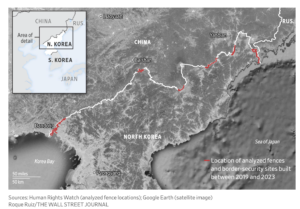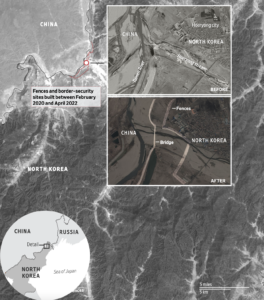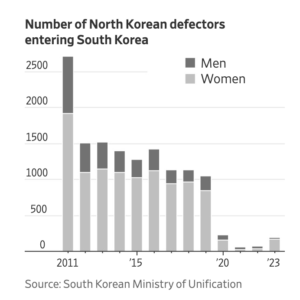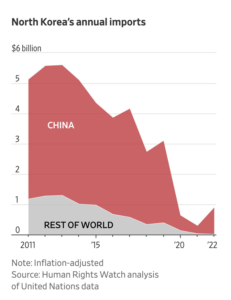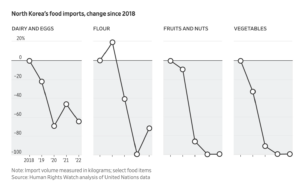North Korea, already one of the world’s most isolated countries, has walled itself off further over the past years, data and satellite images show, with devastating effects for its population.
Satellite images and trade data analyzed by Human Rights Watch document how when Covid-19 hit, North Korea sealed its borders and erected new barriers. International sanctions had already cut into trade, including with China, its primary ally and trading partner. In 2020, commerce with China effectively ceased, worsening food shortages.
In analyzing satellite images of roughly one-quarter of the country’s northern border, the rights organization found authorities built layers of fencing in border areas that had served as trade routes, including where smugglers had brought food into North Korea and where North Koreans had escaped into China before Covid-19. Much of the terrain along North Korea’s northern border, which largely follows the vast Yalu River, is so treacherous that no fencing is needed.
The new fences North Korea built since 2020 included a far-north section of its border with China, according to Human Rights Watch’s analysis of North Korea’s satellite images.
The areas surrounding the North Korean city of Hoeryong, separated from China’s Jilin province by the Tumen River, had been a hot spot for informal trade. That was largely because an existing fence left an opening in a stream leading to the Tumen that had allowed North Koreans to reach crossing points when the water was low.
Since 2020, North Korea has built a bridge across the stream that closed that loophole, and added guard posts to the existing fence. The images show they also added a secondary fence further inland from the river.
Due to the fortified border with China and a “shoot-on-sight” order on North Korea’s northern border, the number of North Korean defectors eventually ending up in South Korea has dwindled since 2020.
Apart from a small number of North Koreans who flee to Russia, virtually all North Korean defectors escape via China, which has long made defectors’ passage difficult. During the pandemic, China’s own Covid restrictions made escapes even harder. China built its own daunting walls along its northern and southern borders to fend off illegal crossings.
After Beijing reopened its border in January 2023, the number of defectors picked up slightly, allowing some defectors stuck in China to flee to South Korea.
Economic sanctions imposed by the United Nations to force Pyongyang to abandon its nuclear ambitions had already hurt North Korea’s imports before Covid, including from China. During the pandemic, commerce with China slowed almost to a standstill.
Imports picked up in 2022. Chinese customs data show they improved further in 2023. Still, imports remain well below levels before the pandemic.
In addition, now, almost all North Korea’s imports are from China, suggesting a further distancing from the rest of the world.
With the sharp drop in trade, food shortages worsened as North Korea’s imports of staple foods and proteins plunged. According to Human Rights Watch, the regime feared imported goods would carry the Covid-19 virus.
In early 2020, North Korea halted train service with China and Russia, which had been how much of its food imports entered. Only the occasional cargo train was let in.
International sanctions had already thrown a large number of North Koreans into food insecurity, defined by the U.N. as consumption insufficient to maintain an active and healthy life.
Between 2020 and 2022, the portion of North Korea’s population without enough food increased to 46%, in the U.N.’s estimates, from around 41% in the previous years.
Informal food trade with China, a lifeline for many North Koreans, was almost entirely wiped out.
“With the pandemic, smuggling from China was blocked. The food situation in North Korea became worse quickly,” a North Korean man who escaped to South Korea with his family by boat in 2023 testified at the U.N. Human Rights Council in Geneva on March 15.
“If someone sells food in North Korea today, they are a traitor,” he said.
In August 2023, North Korea restarted air travel with China, breaking 3½ years of isolation.
The meager contacts Pyongyang has resumed have been restricted to China and Russia. Some Chinese diplomats have returned to North Korea, but humanitarian organizations and most diplomats remain unable to return, according to Human Rights Watch.
Some Russian tourists visited Pyongyang in February, the first foreign tourists to the country since the Kim Jong Un regime slammed its borders closed in early 2020.
While more North Koreans go hungry, the one thing that has thrived in North Korea during the pandemic is Kim Jong Un’s nuclear arsenal. The country has even provided short-range missiles for Russia’s war in Ukraine.

